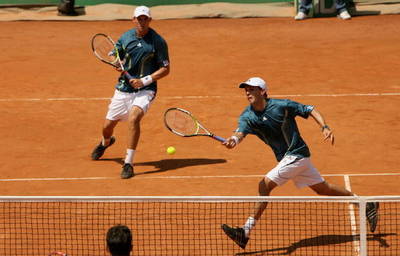After you peak
A peak is a most wonderful and satisfactory thing. You arrive at a point where your performances are measurably optimal. It suggests that you have had a build-up over a period of improvement and perfecting skills, where those skills somehow come together to form something for which you've been striving.
There are two problems with a peak.
First, it's almost impossible to determine when and how you'll peak. Second, what do you do after you've hit that peak.

On tour
I experienced this most profoundly recently. One of my players, let's call him Guy, on the typical rythmn of a French tennis player, plays his club matches in May, then a few tournaments in June, maybe a few tournaments in September after coming back from holiday. The next serious club matches only take place in January, so you could argue that October through December is a period of recuperation and practice.
So a player's peaking is largely determined by the calendar. You want him to be at his best for team events in January and May, and then maintain some tournament play just afterwards to work maybe on his ranking and skills on a more individual basis. It's possible to prepare for this. It's possible to communciate to a tennis player the necessity for optimal practice and physical preparation in April and November/December. This also suggests that all players follow the same rythmn. All players will expect to peak at the same time.
In practice of course this won't happen. Despite all the best efforts of coaches, circumstances will frequently intervene to stop a player from peaking, or a player, through no particular fault of his own, doesn't find himself on a sequence of performances, or potential match opponents, that allow a peak to take place.
With my player, Guy, a peak did take place. The May matches went very well, with an above average conversion of matches into victories, both singles and particularly doubles. The significance of the doubles needs to be highlighted here. Guy is slightly stronger in doubles - a natural volleyer, aggressive server and returner. Also he found himself by chance a regular partner, which hadn't been foreseen at the beginning of the club season.
After the successful club matches, an intense period of five successive weeks with singles and doubles every Sunday, there followed two individual tournaments which didn't go well at all. He registered two defeats, but the nature of the defeats was most surprising. I remember even arguing with Guy that if he had had his two opponents in a club match, he certainly would have won both. For some reason his focus was different, his decision-making on the court found itself on a completely different level.

Peak from doubles
Then there followed a rarity on the French calendar, a doubles tournament. Faced with very capable opponents, Guy found another partner, experienced and aggressive like him, and managed to win two sections of the tournament. This was a thrilling few days, with very high performance levels. I could have anticipated that these levels would be so high, since Guy is a confirmed doubles player, but after the disappointments of the previous week, I wasn't so sure. I could only guess how things would go.
In the week following the doubles victories, a singles tournament was on the calendar, one where Guy had had some success before, but where also some of the doubles players of the previous week were also playing. Boom! Suddenly there followed two immense results, and two other above-average performances. Even in defeat, he lost where both opponents, both higher-ranking, also performed well. In the weeks that followed, all of the performances were excellent, and for me, the coach, I could only confirm a huge jump. In post-match discussions I'd find myself saying, "that was the best I've ever see you play, " and it kept on coming. Sometimes there were little improvements, sometimes quite major ones. More bizarrely, for the coach, these improvements came with no specific preparation on the practice court, since so little time was available for practice in such an intense tournament period.
Then followed a whole sequence of fine singles performances and results. Not peaking, but making progress in various areas of his game at each step, with each new type of opponent.
By this stage Guy was winning regularly against higher-ranked players, and beginning to expect to beat them. Then came one such player, ranked higher, but one Guy expected to beat. However, we heard from other players that this particular player was exceptionally good for his ranking, and had indeed beaten higher ranked players. And so it was, two players reaching a peak, both with very high skill levels. A great great match ensued, Guy winning the first set, mostly by scraping through very tight service games, and achieving one surprise break. In the second set, those big points were lost. Then, in the third, both players were absolutely determined to win, and Guy, with an amazing exhibition of serving, aggressive returning, penetrating rallying, and persistent net sorties, won it 6-1, but in fact, the games were tight. Guy won all the big points. The match lasted almost three hours.
Top of the mountain
After such excellence, where do you go? Onto the next match, but somehow all the next matches are comparitively let-downs. Remarkably Guy continued to win capably, but he simply didn't need to find the highest level to win. Moments would then come in games where almost boredom would creep in, and little patches of mistakes, or ill-judgement, would creep in.
Then came two matches in which Guy dominated his opponent for long stretches, but failed to maintain his sharpness at essential moments. Two unexpected, slightly disappointing, defeats occured.
At this moment I, the coach, would have loved to call a halt to the series of tournaments, a pause to take in the progress achieved. But Guy had been registered well in advance for more tournaments. So some "duty" matches had to be played. Worse, the ruling is in France, if you pull out of a tournament, without a medical certificate, your ranking takes on penalty points.

Outstay your welcome
So frustration sets in. Guy is no longer capable of peaking. Fatigue has set in. He has achieved everything he needs to for the season in terms of ranking. And we still can't get on the coaching court to have a review of everything that has been done.
Oh, for a pause. Just to say - "that's where you peaked, that's our reference for the next season."
